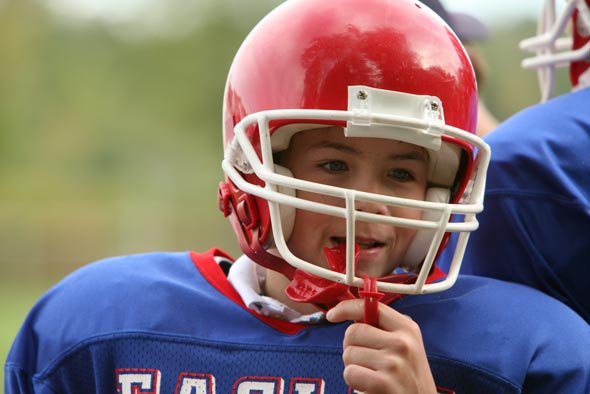How Mouth Guards Prevent Sports Dental Injuries

Did you know that not all offer the same level of protection for your teeth and jaws? If you play a contact sport like football or hockey, you’ll want to schedule a dentist appointment with your sports dentist to be fitted for a custom mouth guard.
In this blog post, our Grand Rapids dentist at Renew Family Dental will explain how prevent sports dental injuries so you can make an informed decision for your smile.
Why do I need a sports mouth guard?
According to the American Dental Association, about a third of dental emergencies are related to sports. When high speeds, flying projectiles, and spirited players come together, it can be a nightmare for your teeth. A sports mouth guard can protect your teeth from injury, whether you’re a professional athlete or just playing for fun.
What sports should I wear mouth guards for?
Athletes who play contact sports will require mouth guards to prevent knocked-out teeth, loose teeth, broken teeth, and other traumatic dental injuries. Contact sports include football, boxing, and hockey. However, our dentist has found that other types of athletes benefit from mouth guards, such as those involved in gymnastics, soccer, volleyball, wrestling, and basketball.
READ MORE: 7 Facts About Your Sports Mouthguard >>
How do mouth guards work?
An is worn over your upper teeth while playing contact sports. A mouth guard forms a protective layer between your teeth and the point of impact. That way, your tooth won’t be knocked out if you’re tackled on the football field or punched in the boxing ring. A mouth guard should be durable enough to withstand concentrated force and resistant to tears. You also should be able to breathe and talk comfortably while wearing your mouth guard.
What are the different types of mouth guards?
There are three different types of mouth guards, which are stock, boil and bite, and custom. The type of mouth guard you get will determine how much your teeth will be protected.
- Stock Mouth Guards: Stock mouth guards are inexpensive because they take the “one size fits all” approach to protecting your teeth and jaws. As a result, these mouth guards are uncomfortable and make it difficult for players to breathe or talk. We do not recommend wearing stock mouth guards because they don’t offer the level of protection your teeth need when playing contact sports.
- Boil and Bite Mouth Guards: Boil and bite mouth guards are only slightly better than stock mouth guards. Boil and bite mouth guards are made from a that softens in boiling water so you can bite into them. The material is shaped to your teeth, but isn’t as durable or comfortable as a custom-fit mouth guard, which can only be provided by a dentist for athletes.
- Custom Mouth Guards: offer a superior level of protection unmatched by anything you could buy at a local sporting goods store. During your appointment, your dentist will take impressions of your teeth so your mouth guard will fit comfortably. The materials used for are durable, yet comfortable enough so you can breathe and talk with ease.
What type of mouth guard offers the best protection?
Custom mouth guards give you the most protection because they are specifically made to fit the unique shape of your upper teeth. While custom mouth guards are also the most expensive, they offer a superior level of protection for your smile that can’t be beat by the generic stock or boil and bite mouth guards you find in sporting good stores. Also, keep in mind that the cost to restore a damaged tooth far exceeds the cost of a custom mouth guard.
If you have a child who wears braces, or another fixed dental appliance, your dentist will also create a mouth guard for your child’s lower teeth. Mouth guards for braces prevent injury from broken wires and brackets.
Ready to Schedule an Appointment?
Alexandra Dodds DDS at Renew Family Dental works hard to prevent sports dental injuries in patients. If you are interested in having a mouth guard for sports made for you or your child, schedule an appointment with our Grand Rapids sports dentist at (616) 245-3205.
